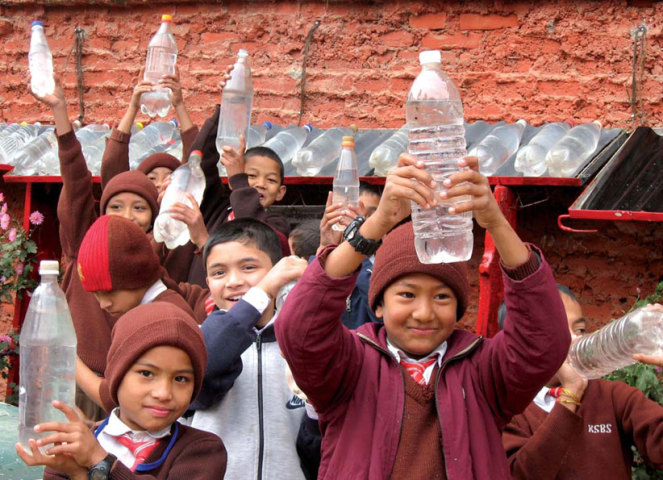
Better health with sunlight and PET bottles
Good quality water, in sufficient quantities, is essential for life. About a sixth of the world’s population do not have access to a source or supply of drinking water and consume contaminated water every day. This lack of water results in some serious diseases: cholera, typhoid, hepatitis A and dysentery. Every day 4,500 children die of diarrhoea around the world.
Treatment of water just before consumption greatly reduces the risk involved in drinking contaminated water: treating water at home can contribute considerably towards reducing the world’s death rate.
Sodis, a simple and effective method for treating water.
The Sodis method (disinfection of water through solar irradiation) is a simple and inexpensive process aimed at improving the microbiological quality of drinking water by destroying the bacteria responsible for illnesses causing diarrhoea.
Heat, combined with the quality of the PET, allows these bacteria to be eliminated.
The contaminated water is poured into a clean bottle of transparent PET, which is laid flat on a corrugated metal sheet. The bottle is then exposed to the sun for six hours.
During this exposure, UV-A rays destroy bacteria, yeasts, mould, viruses, etc., and the process is complete - the water can now be drunk!

 However, some criteria must be met when applying this method:
However, some criteria must be met when applying this method:
- use of local resources: the Sun and PET bottles;
- varying the exposure of the bottles to the Sun, according to the weather conditions and from six hours if there is a blue sky to two days if it is overcast;
- when there is substantial turbidity, i.e. the water is not clear, not transparent and not limpid enough…the action of the sun’s rays is reduced and the water must be treated beforehand by filtration.
Raising awareness and changing behaviour
 The other side of the picture is the fact that this method, so simple and inexpensive, has from the beginning faced doubts and scepticism from among the people for whom it is meant.
The other side of the picture is the fact that this method, so simple and inexpensive, has from the beginning faced doubts and scepticism from among the people for whom it is meant.
So it is essential for the population to be educated by “local networks” in the basic principles of hygiene and the link between water and health, thus bringing about a change in behaviour and a better understanding of the project.
Results
At present, Sodis is used by over 2.1 million people in 33 countries, mainly in Africa and South America.
According to epidemiological studies carried out in regions where the Sodis method has been used, diarrhoea-causing illnesses have been reduced by about 50%.
It has also been demonstrated that Sodis protects users from cholera and typhoid epidemics.
Sodis is recommended by the WHO (World Health Organisation) as a method for treating water at home.






